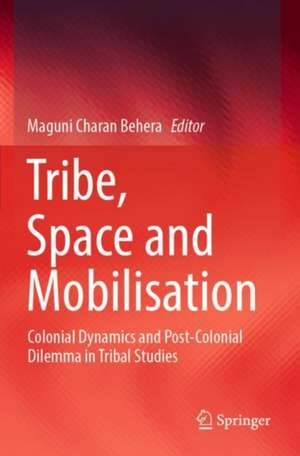Tribe, Space and Mobilisation: Colonial Dynamics and Post-Colonial Dilemma in Tribal Studies
Editat de Maguni Charan Beheraen Limba Engleză Paperback – 30 mar 2023
| Toate formatele și edițiile | Preț | Express |
|---|---|---|
| Paperback (1) | 792.41 lei 6-8 săpt. | |
| Springer Nature Singapore – 30 mar 2023 | 792.41 lei 6-8 săpt. | |
| Hardback (1) | 800.75 lei 3-5 săpt. | |
| Springer Nature Singapore – 29 mar 2022 | 800.75 lei 3-5 săpt. |
Preț: 792.41 lei
Preț vechi: 966.36 lei
-18% Nou
Puncte Express: 1189
Preț estimativ în valută:
151.64€ • 156.67$ • 126.14£
151.64€ • 156.67$ • 126.14£
Carte tipărită la comandă
Livrare economică 19 martie-02 aprilie
Preluare comenzi: 021 569.72.76
Specificații
ISBN-13: 9789811900617
ISBN-10: 9811900612
Pagini: 465
Ilustrații: XIX, 465 p. 1 illus.
Dimensiuni: 155 x 235 mm
Greutate: 0.74 kg
Ediția:1st ed. 2022
Editura: Springer Nature Singapore
Colecția Springer
Locul publicării:Singapore, Singapore
ISBN-10: 9811900612
Pagini: 465
Ilustrații: XIX, 465 p. 1 illus.
Dimensiuni: 155 x 235 mm
Greutate: 0.74 kg
Ediția:1st ed. 2022
Editura: Springer Nature Singapore
Colecția Springer
Locul publicării:Singapore, Singapore
Cuprins
Tribe, Space and Mobilisation: Colonial and Post Colonial Interface in Tribal Studies.- Sherdukpen – British Relations: A Study.- Changing Landscape and Mindscape: Impact of British Colonization on the Badagas – A Study of Rajam Krishnan’s When the Kurinji Blooms.- ‘From Africa’ to ‘Of India’: Siddis through Colonial Period.- State and Tribal Land Alienation in Jharkhand: Following Colonial Footprints?.- Tribal people, Forest Ecology and Colonial rule in Central India: A Retrospective Look.- The Idea of Self Governance and Tribal Revolts in Colonial Period.- The North East India: Colonial Construct of Identity.- Participation of Tribes of Undivided Koraput District of Odisha in India’s Freedom Movement.- The Unwritten Chapters of Anglo-Kurichiya Battles and Malabar Tribal Struggles.- Colonial Representation of Livelihoods of India’s Service Nomads – A Case of the Waghri community.- The Denotified and Nomadic Communities and the Challenges to Substantive Citizenship.- Colonial impact on Pastoral Nomads and Caravan Traders in India: The Raika and the Banjara.
Notă biografică
Maguni Charan Behera, M. A., Ph.D. (Economics) from Utkal University, Bhubaneswar, Odisha, has been pursuing researches on tribal studies and rural economics from mid-1980s. He has authored/edited/co-edited more than 35 volumes on socio-economic and cultural life of tribal and rural people from theoretical and empirical perspectives. To his credit, he has more than sixty research papers on national and international topics published in various national and international journals. He has presented about sixty-five papers in national and international seminars/conferences in the country and abroad. He is a member of many professional bodies. Dr. Behera was a professor of Indigenous Culture Studies and Dean School of Cultural Studies, Central University of Jharkhand, before he joined as a director of Arunachal Institute of Tribal Studies, Rajiv Gandhi University, Itanagar, Arunachal Pradesh, India.
Textul de pe ultima copertă
This book presents multidisciplinary critical engagement in Tribe-British relations, the interfacing between colonial mind and tribal worldview, and some of their contemporary implications to conceptualise tribal space and mobilisation at national, regional, and native levels. The approach, argument, and theoretical underpinnings introduce a new perspective dimension of enquiry in tribal studies and enlarge its scope as a distinct academic discipline. It provides theoretical and methodological insights and an innovative analytical frame for a grand intellectual engagement beyond the boundary of conventional disciplines but within the interactive matrix of India’s social, cultural, political, religious, and economic space. The book is a pioneering work in the emerging field of tribal studies and a vital reference point for students and academics and non-academics alike who are engaged in tribal issues.
Caracteristici
Critically examines the interface between colonial mind and a tribal worldview Introduces tribal studies as an emerging multidisciplinary subject Presents tribe within the interactive matrix of India’s social system
